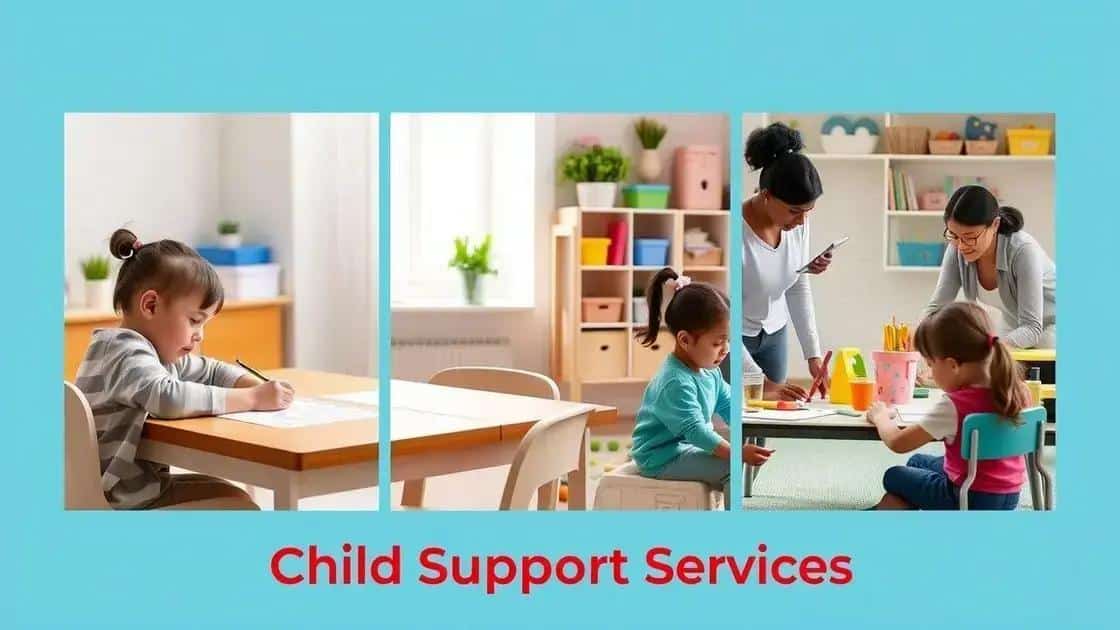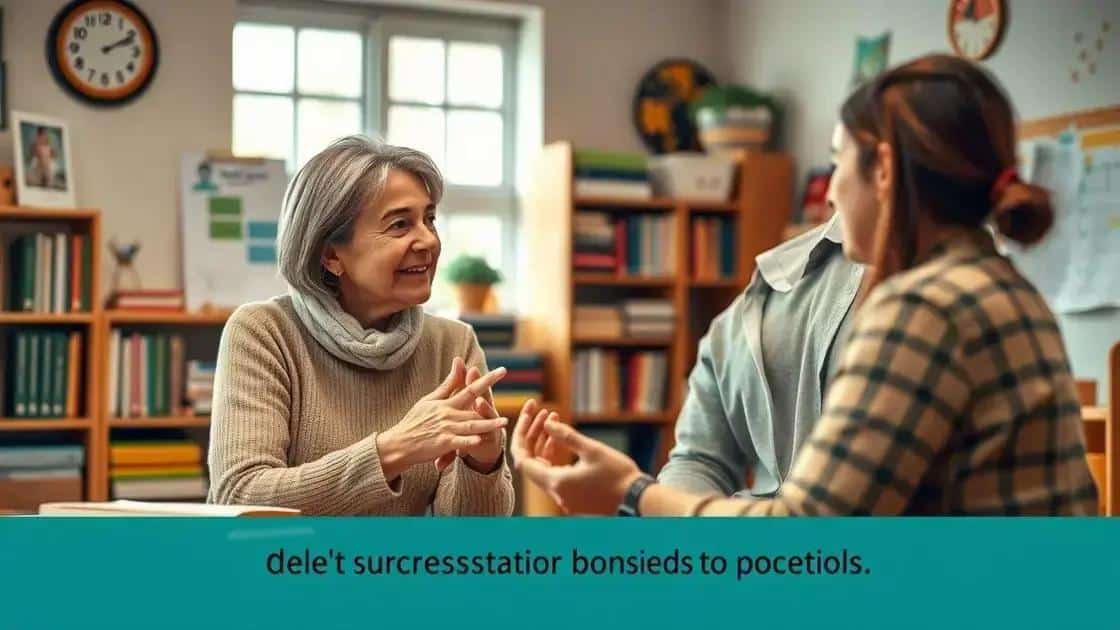Away learning disability support for your child

Away learning disability support provides tailored services such as specialized tutoring and therapy, helping children improve academically and socially while boosting their confidence and self-esteem.
Away learning disability support can make a significant difference in how children experience their education. Have you ever wondered how specialized help can enhance their learning journey? In this article, we’ll uncover the best strategies and resources available.
Understanding learning disabilities and their impact
Understanding learning disabilities is crucial for supporting children who face academic challenges. These disabilities can affect how children process information, making learning tasks more difficult for them.
There are various types of learning disabilities that can impact a child’s ability to read, write, or perform math. For instance, dyslexia affects reading skills, while dyscalculia influences mathematical abilities. Recognizing these disabilities early on can lead to better tailored support systems.
Types of Learning Disabilities
Some common types include:
- Dyslexia: Difficulty with reading and spelling.
- Dysgraphia: Challenges with writing and organizing thoughts.
- Dyscalculia: Issues with understanding numbers and mathematical concepts.
Understanding the specific learning disability is a powerful step. It helps teachers and parents create a supportive environment that meets the child’s unique needs. With the right strategies in place, children can thrive academically.
Many interventions exist to assist children with these disabilities. For example, using multi-sensory approaches can enhance learning by engaging different aspects of their cognition. This means that rather than just reading from books, children might learn through hands-on activities or digital tools that cater to their learning styles.
The Impact of Learning Disabilities
Learning disabilities can affect not only academic performance but also self-esteem and social skills. When children struggle in school, they may feel frustrated and isolated, potentially leading to behavioral problems.
It’s essential to offer encouragement and understanding. By focusing on their strengths, children can build confidence and find methods that work for them. Creating a collaborative support network involving parents, teachers, and specialists is vital to fostering a positive learning environment for these children.
Exploring types of away support services

Exploring types of away support services is essential for parents seeking help for their children with learning disabilities. These services offer tailored assistance that can greatly enhance a child’s learning experience.
Away support services cater to various needs and can include specialized tutoring, therapy sessions, and even residential programs that focus on skill development. Understanding these options helps parents make informed decisions.
Types of Support Services
Some of the common types of away support services include:
- Specialized Tutoring: Focused one-on-one sessions that tailor teaching methods to a child’s learning style.
- Therapeutic Programs: Sessions led by professionals to address emotional and behavioral challenges associated with learning disabilities.
- Residential Programs: Structured environments where children can receive intensive support while away from home.
Choosing the right service depends on the child’s unique challenges and strengths. Engaging with specialists who understand different learning disabilities is beneficial. They can guide parents through the options available to meet their child’s needs effectively.
Moreover, many support services focus on creating a nurturing atmosphere. This helps children build confidence as they learn new skills and overcome barriers they face in traditional educational settings. Parents should look for programs that foster positive experiences and emphasize personal growth.
Benefits of Away Support Services
The benefits of utilizing these services are profound. Children often experience significant improvements in both their academic abilities and self-esteem. A tailored approach allows them to work at their own pace and explore effective learning techniques.
Additionally, many away support services include social skills training which is vital for building relationships and interacting with peers. This training is particularly beneficial for children who may feel isolated due to their learning challenges.
Benefits of away learning disability support
The benefits of away learning disability support are significant for children facing academic challenges. By accessing specialized resources, children can gain the skills they need to succeed.
One major advantage of these support services is the personalized attention children receive. Instead of a one-size-fits-all approach, tailored strategies are developed to meet individual needs. This approach can lead to improved academic performance and greater self-confidence.
Key Benefits
Some key benefits of away support include:
- Customized Learning Plans: Each child gets a unique plan designed for their specific learning disability.
- Increased Confidence: Success in overcoming challenges boosts a child’s self-esteem.
- Social Skill Development: Interacting with peers in a supportive environment helps improve social skills.
- Access to Professional Expertise: Children benefit from the knowledge of experienced professionals who specialize in learning disabilities.
Moreover, children often experience emotional benefits as well. Feeling understood and supported can reduce anxiety and frustration related to learning challenges. This supportive environment fosters positive relationships among peers and instructors, which enhances motivation.
Educational progress can also be observed as children become more engaged. They actively participate in classroom activities and show greater enthusiasm for learning. With methods tailored to their learning styles, children can discover their strengths and areas for growth.
Long-term Impact
Investing in away learning disability support can yield long-term benefits. Children not only develop academic skills but also learn essential life skills that prepare them for future challenges. These experiences can empower them to advocate for themselves and seek help when needed.
Ultimately, embracing away support services creates a foundation for lifelong learning. As children grow, they continue to use the skills acquired through these programs, benefiting them in various facets of life.
How to choose the right support for your child

Choosing the right support for your child is vital when addressing their learning challenges. Finding the best option means understanding your child’s unique needs and how different services can help.
Start by assessing your child’s specific learning disability. Different disabilities require different approaches, so it’s essential to know what challenges your child faces. This knowledge will guide you in selecting the appropriate support services.
Evaluating Support Options
When evaluating potential support options, keep these factors in mind:
- Type of Disability: Ensure the service specializes in your child’s particular learning disability.
- Reputation: Look for reviews and testimonials from other parents who have used the service.
- Qualified Professionals: Check the credentials of the staff and their experience in dealing with learning disabilities.
- Approach to Learning: Investigate the teaching methods used and how they align with your child’s learning style.
Each of these factors will play a crucial role in determining the effectiveness of the support your child receives. It is beneficial to visit potential facilities and observe how support is delivered. This can provide insight into how well the environment supports children with learning disabilities.
Additionally, asking questions during initial consultations can help clarify how the support services will cater to your child’s individual needs. The goal is to create an atmosphere where your child feels empowered and engaged in the learning process.
Involving Your Child
Involving your child in the decision-making process can also be beneficial. Discuss different options and gauge their feelings about various types of support. Children often have valuable insight into what makes them comfortable and effective in learning.
Ultimately, choosing the right support requires careful consideration and an understanding of your child’s unique requirements. By exploring options, evaluating them thoroughly, and keeping your child’s preferences in mind, you create the best chance for success in their learning journey.
FAQ – Frequently Asked Questions About Learning Disability Support
What types of support are available for children with learning disabilities?
There are various types of support, including specialized tutoring, therapy programs, and residential services tailored to meet individual needs.
How can I evaluate which support service is best for my child?
Assess your child’s specific needs, research the qualifications of the professionals, and look for reviews from other parents.
Is it important to involve my child in the decision-making process?
Yes, involving your child helps them feel empowered and comfortable with the support they will receive.
What long-term benefits can my child gain from away learning disability support?
Support services can lead to improved academic performance, enhanced self-esteem, and better social skills, benefiting your child in the long run.





